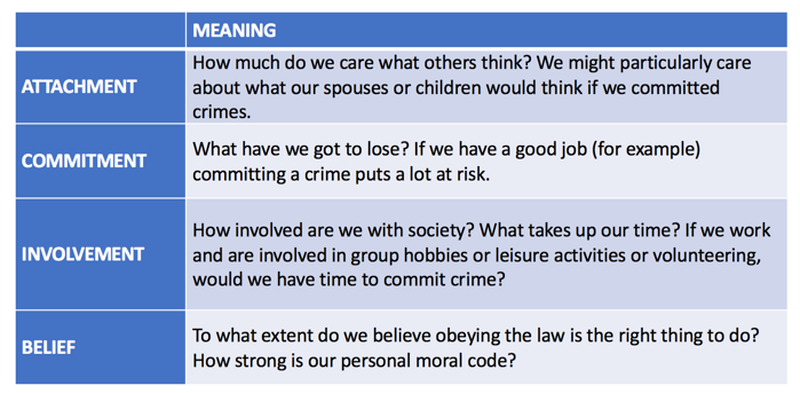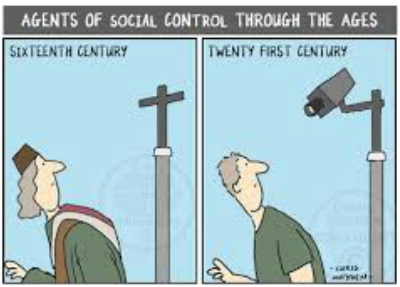Have you ever wondered why some people choose to break the law while others consistently adhere to societal norms? It’s a question that has puzzled sociologists and criminologists for centuries. In the 1960s, Travis Hirschi, a prominent sociologist, proposed a groundbreaking theory that sought to explain this phenomenon: Social Control Theory. He argued that our bonds to society, rather than our innate tendencies, are the key factors that prevent us from engaging in criminal behavior. In essence, Hirschi’s theory suggests that we are all capable of committing crimes, but the strength of our social ties, such as family, friends, and community, can act as a restraining force, deterring us from deviant actions.

Image: www.tutor2u.net
Social Control Theory is not just an abstract idea; it has real-world implications for understanding and addressing crime. By examining the factors that contribute to strong social bonds, we can develop strategies for preventing crime and promoting social order. This theory has been used to inform a range of interventions, from family support programs to community policing initiatives, aimed at fostering a sense of belonging and accountability within society. In this article, we will delve deeper into Hirschi’s Social Control Theory, examining its key concepts, applications, and ongoing relevance in understanding the complexities of crime and social control.
Hirschi’s Social Control Theory: A Deeper Dive
At its core, Hirschi’s Social Control Theory postulates that individuals are more likely to conform to societal norms and laws when they have strong social bonds, which act as a form of social control. These bonds are characterized by four key elements:
1. Attachment: Feeling Connected
Attachment refers to the emotional ties we have with individuals and institutions, such as family, friends, teachers, and mentors. When we feel a strong sense of attachment to others, we are more likely to care about their opinions and avoid engaging in behaviors that could harm our relationships. For instance, a teenager who has a strong attachment to their parents might be less likely to engage in risky behavior, knowing it could disappoint them.
2. Commitment: Investing in the Future
Commitment refers to the investments we make in conventional activities and goals, such as education, career, and social status. When we have a lot to lose by engaging in criminal behavior, we are more likely to adhere to societal norms. A student who is committed to excelling in their studies is less likely to skip class or engage in other disruptive behavior, as it could jeopardize their academic goals.

Image: amazonia.fiocruz.br
3. Involvement: Staying Busy and Engaged
Involvement refers to the time spent engaging in conventional activities, such as school, work, hobbies, and community involvement. When we are actively involved in prosocial activities, we have less time and energy to engage in criminal behavior. A young person who is heavily involved in sports or volunteer work might have less time to engage in delinquent activities.
4. Belief: Sharing Societal Values
Belief refers to our acceptance of the moral validity of societal rules and laws. When we believe that the law is fair and just, we are more likely to comply with it. Conversely, individuals who do not share these beliefs are more likely to engage in criminal behavior. For instance, someone who believes in the importance of social justice might be more likely to engage in civil disobedience, even if it is illegal, as they see their actions as morally justified.
The Evolving Landscape: Modern Applications of Social Control Theory
Hirschi’s Social Control Theory has endured for decades, and its influence can be seen in various contemporary approaches to crime prevention and intervention. Here are some key areas where the theory continues to inform current practices:
1. Family and Community Support Programs: These programs aim to strengthen family bonds and promote community involvement, recognizing that strong social connections can deter individuals from engaging in criminal behavior. They often focus on fostering communication, conflict resolution skills, and positive parental involvement, equipping families with the tools to provide structure and support.
2. Youth Mentoring and Diversion Programs: These programs connect at-risk youth with positive role models who can provide guidance, support, and opportunities for personal development. They offer alternatives to traditional justice systems, preventing young people from becoming entangled in the criminal justice system. Mentors can provide encouragement, build self-esteem, and instill positive values, thereby strengthening their bonds to conventional society.
3. Restorative Justice Initiatives: Restorative justice approaches are gaining popularity in various jurisdictions. They emphasize repairing the harm caused by crime and promoting reconciliation between the offender and the victim. Instead of focusing solely on punishment, restorative justice focuses on rehabilitation and responsibility, holding the offenders accountable for their actions and fostering a sense of community within the justice process.
Tips for Strengthening Your Social Bonds
Hirschi’s Social Control Theory provides valuable insights into the importance of social bonds in deterring criminal behavior. It also offers practical strategies for individuals and communities seeking to promote social order. Here are some tips for strengthening your social connections and enhancing your sense of belonging:
- Cultivate Meaningful Relationships: Invest time and effort in developing strong bonds with family, friends, and community members. Engage in activities that foster connection and shared experiences.
- Engage in Prosocial Activities: Seek opportunities for involvement in community organizations, volunteer work, or other activities that benefit society. Participating in these activities can strengthen your connections to community institutions and values.
- Embrace Diversity and Inclusion: Foster a welcoming and inclusive environment for individuals from different backgrounds and experiences. Building bridges of understanding and empathy can create a more cohesive and supportive community.
- Promote Positive Social Norms: Encourage ethical behavior and respect for the law within your community. Celebrate positive achievements and foster a collective sense of responsibility for promoting well-being.
By implementing these strategies and fostering a sense of belonging and responsibility, individuals and communities can collectively contribute to building a safer and more just society.
Frequently Asked Questions About Social Control Theory
What are the limitations of Social Control Theory?
While Social Control Theory offers valuable insights into the role of social bonds in deterring crime, it has been criticized for overlooking individual characteristics and other factors that may contribute to criminal behavior. Critics argue that the theory may oversimplify the complexity of crime and that some people may engage in criminal behavior despite having strong social bonds.
How can Social Control Theory be applied in the context of cybercrime?
Social Control Theory can be applied to the context of cybercrime by examining the role of social bonds in deterring online criminal behavior. For instance, individuals with strong connections to family and friends might be less likely to engage in cyberbullying or other online offenses. Additionally, online communities and digital spaces can also provide a sense of belonging and social control.
What are some other theories that explore the causes of crime?
Besides Social Control Theory, other prominent theories of crime include:
- Strain Theory: This theory suggests that crime is a response to societal pressures and inequalities, where individuals may resort to illegal means to achieve their goals when legitimate opportunities are blocked.
- Differential Association Theory: This theory argues that criminal behavior is learned through interactions with others, where individuals are exposed to definitions of crime and delinquency through their social networks.
- Labeling Theory: This theory emphasizes the role of social labels in shaping an individual’s identity and behavior. It suggests that individuals who are labeled as criminals are more likely to engage in criminal behavior due to the stigma associated with the label.
Hirschi’S Social Control Theory.
Conclusion
Hirschi’s Social Control Theory offers a powerful framework for understanding the link between social bonds and crime. It highlights the importance of fostering strong connections within families, communities, and society as a whole. By strengthening these ties, we can create a more cohesive and supportive environment, fostering a sense of belonging and deterring individuals from engaging in criminal behavior. We can all play a role in promoting healthy social connections by cultivating meaningful relationships, engaging in prosocial activities, and embracing diversity and inclusion.
Are you interested in learning more about social control theory and its implications for crime prevention? Share your thoughts in the comments below!





